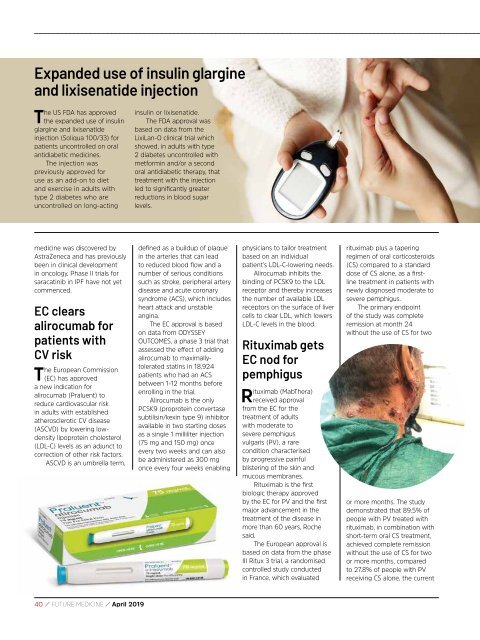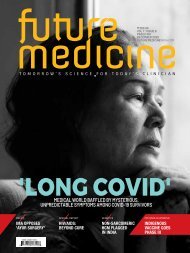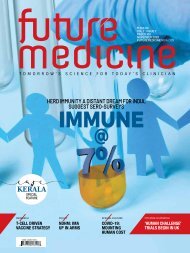Create successful ePaper yourself
Turn your PDF publications into a flip-book with our unique Google optimized e-Paper software.
Expanded use of insulin glargine<br />
and lixisenatide injection<br />
The US FDA has approved<br />
the expanded use of insulin<br />
glargine and lixisenatide<br />
injection (Soliqua 100/33) for<br />
patients uncontrolled on oral<br />
antidiabetic medicines.<br />
The injection was<br />
previously approved for<br />
use as an add-on to diet<br />
and exercise in adults with<br />
type 2 diabetes who are<br />
uncontrolled on long-acting<br />
insulin or lixisenatide.<br />
The FDA approval was<br />
based on data from the<br />
LixiLan-O clinical trial which<br />
showed, in adults with type<br />
2 diabetes uncontrolled with<br />
metformin and/or a second<br />
oral antidiabetic therapy, that<br />
treatment with the injection<br />
led to significantly greater<br />
reductions in blood sugar<br />
levels.<br />
medicine was discovered by<br />
AstraZeneca and has previously<br />
been in clinical development<br />
in oncology. Phase II trials for<br />
saracatinib in IPF have not yet<br />
commenced.<br />
EC clears<br />
alirocumab for<br />
patients with<br />
CV risk<br />
The European Commission<br />
(EC) has approved<br />
a new indication for<br />
alirocumab (Praluent) to<br />
reduce cardiovascular risk<br />
in adults with established<br />
atherosclerotic CV disease<br />
(ASCVD) by lowering lowdensity<br />
lipoprotein cholesterol<br />
(LDL-C) levels as an adjunct to<br />
correction of other risk factors.<br />
ASCVD is an umbrella term,<br />
defined as a buildup of plaque<br />
in the arteries that can lead<br />
to reduced blood flow and a<br />
number of serious conditions<br />
such as stroke, peripheral artery<br />
disease and acute coronary<br />
syndrome (ACS), which includes<br />
heart attack and unstable<br />
angina.<br />
The EC approval is based<br />
on data from ODYSSEY<br />
OUTCOMES, a phase 3 trial that<br />
assessed the effect of adding<br />
alirocumab to maximallytolerated<br />
statins in 18,924<br />
patients who had an ACS<br />
between 1-12 months before<br />
enrolling in the trial.<br />
Alirocumab is the only<br />
PCSK9 (proprotein convertase<br />
subtilisin/kexin type 9) inhibitor<br />
available in two starting doses<br />
as a single 1 milliliter injection<br />
(75 mg and 150 mg) once<br />
every two weeks and can also<br />
be administered as 300 mg<br />
once every four weeks enabling<br />
physicians to tailor treatment<br />
based on an individual<br />
patient’s LDL-C-lowering needs.<br />
Alirocumab inhibits the<br />
binding of PCSK9 to the LDL<br />
receptor and thereby increases<br />
the number of available LDL<br />
receptors on the surface of liver<br />
cells to clear LDL, which lowers<br />
LDL-C levels in the blood.<br />
Rituximab gets<br />
EC nod for<br />
pemphigus<br />
Rituximab (MabThera)<br />
received approval<br />
from the EC for the<br />
treatment of adults<br />
with moderate to<br />
severe pemphigus<br />
vulgaris (PV), a rare<br />
condition characterised<br />
by progressive painful<br />
blistering of the skin and<br />
mucous membranes.<br />
Rituximab is the first<br />
biologic therapy approved<br />
by the EC for PV and the first<br />
major advancement in the<br />
treatment of the disease in<br />
more than 60 years, Roche<br />
said.<br />
The European approval is<br />
based on data from the phase<br />
III Ritux 3 trial, a randomised<br />
controlled study conducted<br />
in France, which evaluated<br />
rituximab plus a tapering<br />
regimen of oral corticosteroids<br />
(CS) compared to a standard<br />
dose of CS alone, as a firstline<br />
treatment in patients with<br />
newly diagnosed moderate to<br />
severe pemphigus.<br />
The primary endpoint<br />
of the study was complete<br />
remission at month 24<br />
without the use of CS for two<br />
or more months. The study<br />
demonstrated that 89.5% of<br />
people with PV treated with<br />
rituximab, in combination with<br />
short-term oral CS treatment,<br />
achieved complete remission<br />
without the use of CS for two<br />
or more months, compared<br />
to 27.8% of people with PV<br />
receiving CS alone, the current<br />
40 / FUTURE MEDICINE / <strong>April</strong> <strong>2019</strong>


















